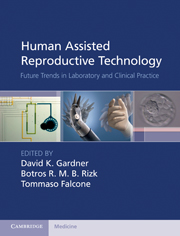Book contents
- Human Assisted Reproductive Technology
- Human Assisted Reproductive Technology
- Copyright page
- Dedication
- Contents
- Contributors
- Preface
- Acknowledgments
- Chapter 1 Use of robotics in reproductive surgery
- Chapter 2 Removal of hydrosalpinges and uterine leiomyoma to improve IVF outcome
- Chapter 3 Ovarian endometriomas:
- Chapter 4 Impact of uterine cavity abnormalities on IVF and pretreatment cavity evaluation
- Chapter 5 Sperm retrieval techniques
- Chapter 6 New concepts in ovarian stimulation
- Chapter 7 GnRH antagonists in ART
- Chapter 8 Pharmacogenetics of ovarian stimulation in the twenty-first century
- Chapter 9 Non-invasive diagnosis of endometriosis with proteomic technologies
- Chapter 10 Antiangiogenic agents for endometriosis
- Chapter 11 New concepts in the management of polycystic ovary syndrome
- Chapter 12 Adjuvant therapy to increase implantation rates
- Chapter 13 Ovarian hyperstimulation syndrome
- Chapter 14 The evidence-based practice of assisted reproduction
- Chapter 15 Three-dimensional in vitro ovarian follicle culture
- Chapter 16 Artificial gametes
- Chapter 17 Current status and future trends of the clinical practice of human oocyte in vitro maturation
- Chapter 18 Oocyte and zona imaging
- Chapter 19 Granulosa cells and their impact on human ART
- Chapter 20 Sperm diagnosis:
- Chapter 21 Embryo culture in the twenty-first century
- Chapter 22 Morphometric analyses of embryos
- Chapter 23 Embryo biopsy:
- Chapter 24 Analysis of the embryonic transcriptome
- Chapter 25 Analysis of embryo-derived factors as markers of developmental potential and viability
- Chapter 26 Proteomics analysis of the endometrium and embryo. Can we improve IVF outcome?
- Chapter 27 Analysis of embryo metabolism and the metabolome to identify the most viable embryo within a cohort
- Chapter 28 Oocyte and embryo cryopreservation
- Index
Chapter 25 - Analysis of embryo-derived factors as markers of developmental potential and viability
Published online by Cambridge University Press: 16 May 2011
- Human Assisted Reproductive Technology
- Human Assisted Reproductive Technology
- Copyright page
- Dedication
- Contents
- Contributors
- Preface
- Acknowledgments
- Chapter 1 Use of robotics in reproductive surgery
- Chapter 2 Removal of hydrosalpinges and uterine leiomyoma to improve IVF outcome
- Chapter 3 Ovarian endometriomas:
- Chapter 4 Impact of uterine cavity abnormalities on IVF and pretreatment cavity evaluation
- Chapter 5 Sperm retrieval techniques
- Chapter 6 New concepts in ovarian stimulation
- Chapter 7 GnRH antagonists in ART
- Chapter 8 Pharmacogenetics of ovarian stimulation in the twenty-first century
- Chapter 9 Non-invasive diagnosis of endometriosis with proteomic technologies
- Chapter 10 Antiangiogenic agents for endometriosis
- Chapter 11 New concepts in the management of polycystic ovary syndrome
- Chapter 12 Adjuvant therapy to increase implantation rates
- Chapter 13 Ovarian hyperstimulation syndrome
- Chapter 14 The evidence-based practice of assisted reproduction
- Chapter 15 Three-dimensional in vitro ovarian follicle culture
- Chapter 16 Artificial gametes
- Chapter 17 Current status and future trends of the clinical practice of human oocyte in vitro maturation
- Chapter 18 Oocyte and zona imaging
- Chapter 19 Granulosa cells and their impact on human ART
- Chapter 20 Sperm diagnosis:
- Chapter 21 Embryo culture in the twenty-first century
- Chapter 22 Morphometric analyses of embryos
- Chapter 23 Embryo biopsy:
- Chapter 24 Analysis of the embryonic transcriptome
- Chapter 25 Analysis of embryo-derived factors as markers of developmental potential and viability
- Chapter 26 Proteomics analysis of the endometrium and embryo. Can we improve IVF outcome?
- Chapter 27 Analysis of embryo metabolism and the metabolome to identify the most viable embryo within a cohort
- Chapter 28 Oocyte and embryo cryopreservation
- Index
Summary
Keywords
- Type
- Chapter
- Information
- Human Assisted Reproductive TechnologyFuture Trends in Laboratory and Clinical Practice, pp. 278 - 288Publisher: Cambridge University PressPrint publication year: 2011
- 1
- Cited by



